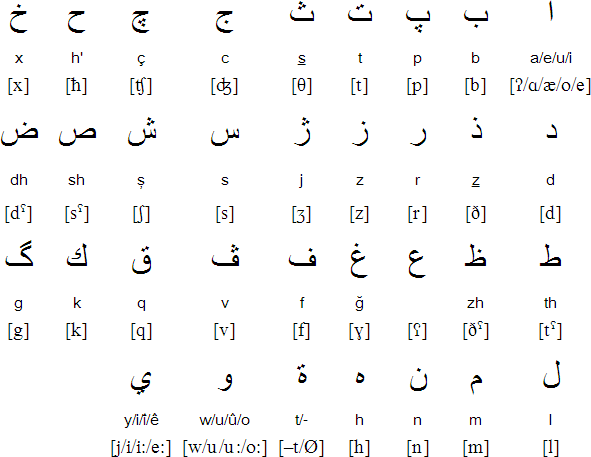Shabaki is a language spoken by Shabak people in Mosul, Iraq. It is part of the northwestern group of the Iranian part of the Indo-Iranian branch of the Indo-European family. The Shabaki language belongs to the Zaza-Gorani group and is supposed to share major similarities with Gorani dialects such as Hewremi, Bajelani and Sarli. It's written in Arabic Alphabet and has 28 Letters .
In 1989 an estimate of speakers of Shabaki was put between 10,000 and 20,000. According to Shabaki media man (Ghanem Musawi), those statistics are not correct because the former regime of AlBaath forced the Shabak People to choose between Arabization and Kurdization .

Karêman hindî çi la cenabî qonsur efendî. Aro çi terefî hukmetî nereman teyandin. Me goman, cenabî qonsur efendî lame musaâde kero, ema rayenme feqîrenme, zuliman serman.
Amendments provided by Michael Peter Füstumum
گِـــﺷتﺑﻧﻲﯾﺂدﻣﻲَﺑوﻣچدھﺎي ﺑﺂزادي واﯾکﻧﻲ ﺑﺣﻘوق وﻗدر دار ودﻧﯾﺎن ﺑﻧﺷﺎ ﻋﻘل ودﻣﯾر وﻻزم ﺑدا ﺑﺳﺗﺎﻧﺎ چﻘﺎﺗﻲ ھﯾﺷﺎن ﺑﺑراﯾﻲ
All human beings are born free and equal in dignity and rights. They are endowed with reason and conscience and should act towards one another in a spirit of brotherhood.
(Article 1 of the Universal Declaration of Human Rights)
Information about Shabaki
http://en.wikipedia.org/wiki/Shabak_language
http://www.ethnologue.com/show_language.asp?code=sdb
Arabic - Shabaki dictionary
http://www.alshabak.net/htm/creation/dictionary.htm
Shabak Websites (in Arabic)
http://www.alshabak.net
http://www.shabak.de
http://shabak.yahooboard.net
http://www.shabakvoices.net
Information provided by Abduzzahra Agha (عبد الزهرة آغا) and Ghanem Musawi (غانم الموسوي)
Avestan, Bactrian Baluchi, Bartangi, Dari, Gilaki, Hazaragi, Ishkashimi, Judeo-Persian, Juhuri, Khufi, Kumzari, Kurdish, Luri, Mazandarani, Munji, Ossetian, Ormuri, Oroshor, Persian, Parthian, Pashto, Rushani, Sanglechi, Sarikoli, Shabaki, Shughni, Tajik, Talysh, Tat, Wakhi, Wanetsi, Yaghnobi, Yazghulami, Yidgha, Zazaki
Adamaua Fulfulde, Afrikaans, Arabic (Algerian), Arabic (Bedawi), Arabic (Chadian), Arabic (Egyptian), Arabic (Gulf), Arabic (Hassaniya), Arabic (Hejazi), Arabic (Lebanese), Arabic (Libyan), Arabic (Modern Standard), Arabic (Moroccan), Arabic (Najdi), Arabic (Sudanese), Arabic (Syrian), Arabic (Tunisian), Arwi, Äynu, Azeri, Balanta-Ganja, Balti, Baluchi, Beja, Belarusian, Bosnian, Brahui, Chagatai, Chechen, Chittagonian, Comorian, Crimean Tatar, Dargwa, Dari, Dhatki, Dogri, Domari, Gawar Bati, Gawri, Gilaki, Hausa, Hazaragi, Hindko, Indus Kohistani, Kabyle, Kalkoti, Karakalpak, Kashmiri, Kazakh, Khowar, Khorasani Turkic, Khwarezmian, Konkani, Kumzari, Kurdish, Kyrgyz, Lezgi, Lop, Luri, Maba, Maguindanao, Malay, Malay (Terengganu), Mandinka, Marwari, Mazandarani, Mogholi, Morisco, Mozarabic, Munji, Noakhailla, Nubi, Ormuri, Palula, Parkari Koli, Pashto, Persian/Farsi, Punjabi, Qashqai, Rajasthani, Rohingya, Salar, Saraiki, Sawi, Serer, Shabaki, Shina, Shughni, Sindhi, Somali, Soninke, Tatar, Tausūg, Tawallammat Tamajaq, Tayart Tamajeq, Ternate, Torwali, Turkish, Urdu, Uyghur, Uzbek, Wakhi, Wanetsi, Wolof, Xiao'erjing, Yidgha
[top]
You can support this site by Buying Me A Coffee, and if you like what you see on this page, you can use the buttons below to share it with people you know.

If you like this site and find it useful, you can support it by making a donation via PayPal or Patreon, or by contributing in other ways. Omniglot is how I make my living.
Note: all links on this site to Amazon.com, Amazon.co.uk
and Amazon.fr
are affiliate links. This means I earn a commission if you click on any of them and buy something. So by clicking on these links you can help to support this site.
[top]